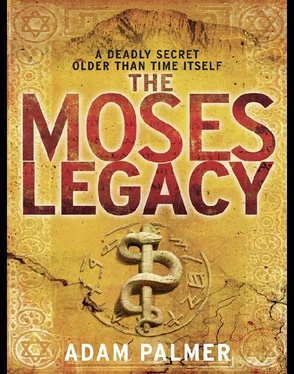Adam Palmer - The Moses Legacy
Здесь есть возможность читать онлайн «Adam Palmer - The Moses Legacy» — ознакомительный отрывок электронной книги совершенно бесплатно, а после прочтения отрывка купить полную версию. В некоторых случаях можно слушать аудио, скачать через торрент в формате fb2 и присутствует краткое содержание. Жанр: Триллер, на английском языке. Описание произведения, (предисловие) а так же отзывы посетителей доступны на портале библиотеки ЛибКат.
- Название:The Moses Legacy
- Автор:
- Жанр:
- Год:неизвестен
- ISBN:нет данных
- Рейтинг книги:4 / 5. Голосов: 1
-
Избранное:Добавить в избранное
- Отзывы:
-
Ваша оценка:
- 80
- 1
- 2
- 3
- 4
- 5
The Moses Legacy: краткое содержание, описание и аннотация
Предлагаем к чтению аннотацию, описание, краткое содержание или предисловие (зависит от того, что написал сам автор книги «The Moses Legacy»). Если вы не нашли необходимую информацию о книге — напишите в комментариях, мы постараемся отыскать её.
The Moses Legacy — читать онлайн ознакомительный отрывок
Ниже представлен текст книги, разбитый по страницам. Система сохранения места последней прочитанной страницы, позволяет с удобством читать онлайн бесплатно книгу «The Moses Legacy», без необходимости каждый раз заново искать на чём Вы остановились. Поставьте закладку, и сможете в любой момент перейти на страницу, на которой закончили чтение.
Интервал:
Закладка:
He would have to bide his time.
The trouble was that they had hired a jeep while he was relying on a taxi. He had told the driver to wait and paid him handsomely for doing so, but he could hardly leap into the taxi and say ‘Follow that jeep’ without giving away that he was up to something. And he could hardly expect a local taxi driver to help a foreigner against a powerful public official.
But the very fact that they were visiting places that others couldn’t get to was an encouraging sign. He sensed that an opportunity would present itself very soon.
Chapter 31
‘The theory that Yuya was Joseph of the Old Testament has been around for donkey’s years,’ Mansoor acknowledged, still in a state of shock. ‘But the academic community never took it seriously. I’d always thought of it as an amateur’s theory.’
‘But it has quite a lot going for it, even apart from what Daniel’s just translated,’ said Gabrielle. ‘A foreigner who rose to high rank in ancient Egypt. The beard and lack of body piercings. The name itself, which also has elements of Yahowa or Jehovah. The fact that he was the pharaoh’s father-in-law. And then there’s the Great Harris Papyrus.’
‘Oh, you’re not going to throw that in surely?’ Mansoor sneered.
‘Why not?’
‘Wait a minute,’ Daniel interrupted. ‘What’s the Great Harris Papyrus?’
He looked back and forth between Mansoor and Gabrielle, who were looking at each other. Eventually Gabrielle shrugged and spoke.
‘The Great Harris Papyrus was the longest papyrus ever found in ancient Egypt. Named after the collector who acquired it, the Great Harris Papyrus was one of the most important papyri of ancient Egypt. Some 42 metres long, it contained 1,500 lines of text.’
‘But what’s it got to do with Joseph?’
‘In its final section, it refers to someone called “Yarsu”, which sounds a bit like Yosef, the Hebrew form of Joseph. The text goes something like “Yarsu, a Syrian was with them as Leader. He made the whole land pay tribute to him; he united his companions and looted their possessions. They made the Gods like men, and no sacrifices were offered in the temples.”’
‘ Syrian, ’ Mansoor echoed for emphasis.
‘Yes, but the term Syria was sometimes used to include Canaan, where Joseph originated. And making “the whole land pay tribute to him” sounds like the way Joseph gained effective control of Egypt, by winning the support of the pharaoh.’
Mansoor looked decidedly underwhelmed.
‘And what about: “united his companions and looted their possessions”?’
Gabrielle thought about this for a few seconds.
‘It could refer either to the act of holding the ordinary Egyptian people to ransom because of the famine and his monopoly over the grain supplies. Or it might refer to the way he played those mind games with his own brothers before revealing himself. But the clincher is: “They made the Gods like men.” Who else do we know who made Gods like men? Who believed that man was created in the image of God?’
‘The Israelites,’ Daniel muttered, not quite trusting his voice.
‘ Exactly! ’ cried Gabrielle triumphantly. ‘And it says that no sacrifices were offered in the temples. That must be a reference to the Amarna experiment when Akhenaten not only banned the worship of Amun and decreed the Aten to be the one true God, but even created a new city in his honour and moved his entire court there.’
‘But that was a generation later,’ said Mansoor. ‘Yuya wasn’t around by then.’
‘Yes, but the papyrus was written over 200 years after that, when the time-scale might have got confused.’
Mansoor was shaking his head.
‘Most historians believe Yarsu to be another historical figure.’
‘But there’s no proof that they’re right,’ Gabrielle declared. ‘In any case Yarsu clearly sounds like Yosef or Joseph. But more important than that, it means “the self-made man”. Who could be more of a self-made man, than a foreigner who rose from humble origins to become the pharaoh’s right-hand man – like Joseph?’
Mansoor was not one to admit defeat easily, but he smiled at Gabrielle’s arguments, impressed. He turned to Daniel, who seemed to be in a dream world as he stared at a wall.
‘Earth to Daniel,’ he said, remembering the old taunt that his American students sometimes used.
‘What’s that?’ asked Daniel, pointing to a part of the wall.
‘Those are inscriptions from the Book of the Dead. Every tomb has some. Why?’
‘Every tomb has the same inscriptions?’
‘No, every tomb is different. The inscriptions are supposed to relate to the individual.’
‘And those illustrations?’
‘That’s Chapter 148.’
‘The cows?’
‘The seven celestial cows and a bull. A symbol of fertility. What of it?’
‘It’s just that it reminded me of… the very thing that led to Joseph being appointed Pharaoh’s right-hand man: he predicted the seven years of famine to follow the seven years of plenty by his correct interpretation of Pharaoh’s dream about the seven fat cows and the seven thin cows.’
Chapter 32
The office was busy when a six-page fax arrived at the Egyptian Ministry of Health. The message was picked up from the machine by a very junior member of staff who, upon recognizing its importance, handed it over to one of his superiors, who in turn handed it over to another. It ended up in the hands of a sixty-three-year-old white-haired wiry man, with a frail body, but a piercing, determined look in his eyes. That man was Farooq Mahdi, the Minister of Health, and he was now studying the document.
The fax described certain events in England and warned of the threat posed by two people: an Englishman called Daniel Klein and an Austrian citizen called Gabrielle Gusack. The document went on to say that both of them were highly respected academics and that they were believed to be travelling in the company of the Vice Minister of Culture, Akil Mansoor.
However, the document took great pains to emphasize that there was no suggestion that Akil Mansoor was in any way, shape or form aware of the threat posed by these two individuals. Indeed, it was because of his ignorance of the danger they posed that he was himself vulnerable to them and it was for this reason all the more imperative that he be warned and that they be apprehended as quickly as possible.
But where was Akil Mansoor now? And where were Daniel Klein and Gabrielle Gusack, for that matter?
A few minutes later, Mahdi’s secretary had tracked down the information that Mansoor had flown with Klein and Gusack to Luxor with the intention of visiting the Valley of the Kings. But because the secretary had said it was urgent, Mansoor’s office had kindly given his mobile number.
The minister wasn’t sure if there was coverage in the area where Mansoor was, but he decided to try. The call went straight to voicemail, and a voice told him that the number could not receive calls for the time being and invited him to leave a message.
The Minister of Health left an urgent message for Mansoor, hoping that he would hear it soon.
Chapter 33
‘It’s known to the locals as the Valley of the Monkeys and the tomb itself is known as the Tomb of the Baboons, because of the depictions of baboons on one of the walls.’
Mansoor was driving them on a spur road across the hot, dry sands, from the main car park of the Valley of the Kings to the western valley, some three kilometres away.
‘Didn’t they actually find a cache of mummified baboons in the valley?’
Mansoor glanced at Daniel and smiled. ‘They only found one from this western valley. Others were found in various other locations.’
Читать дальшеИнтервал:
Закладка:
Похожие книги на «The Moses Legacy»
Представляем Вашему вниманию похожие книги на «The Moses Legacy» списком для выбора. Мы отобрали схожую по названию и смыслу литературу в надежде предоставить читателям больше вариантов отыскать новые, интересные, ещё непрочитанные произведения.
Обсуждение, отзывы о книге «The Moses Legacy» и просто собственные мнения читателей. Оставьте ваши комментарии, напишите, что Вы думаете о произведении, его смысле или главных героях. Укажите что конкретно понравилось, а что нет, и почему Вы так считаете.












